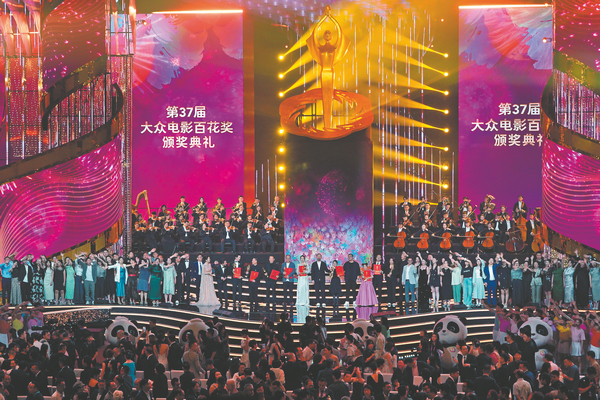
 0 Comment(s)
0 Comment(s) Print
Print E-mail China Daily, August 6, 2024
E-mail China Daily, August 6, 2024

Winners and judges at the 37th Hundred Flowers Awards in Chengdu, Sichuan province, on Sunday. [Tang Wenhao/Xinhua]
On Sunday night, 101 jurors representing movie enthusiasts from across the country assembled in Chengdu, the capital of Sichuan province, to select the recipients of the 37th Hundred Flowers Awards. Established under the advocacy of former premier Zhou Enlai in 1962, it is China's oldest cinematic accolade.
Zhang Yimou, the auteur known for his work on the opening and closing ceremonies of both the 2008 Summer Olympic Games and 2022 Winter Olympic Games, took home the Best Director Award for Article 20, a film inspired by real-life cases of justifiable defense. It was the eighth time for the 74-year-old director to be honored at the Hundred Flowers Awards, but his first time winning best director.
Zhang said that the award was a testament to public recognition and he felt honored to have been nominated alongside four fellow filmmakers, including Rao Xiaozhi and Wuershan, whom he praised as the future of China's film industry.

Ma Li wins Best Actress for Article 20. [Tang Wenhao/Xinhua]
Shining stars
Held biennially, the Hundred Flowers Awards is seen as a retrospective of the best Chinese films of the previous two years, as well as a glamorous event that attracts numerous A-list stars.
A thought-provoking story that delves into concepts of justice, Article 20 also picked up two other awards — Ma Li for Best Actress and Zhao Liying for Best Supporting Actress.
Upon winning the Best Actress Award with 48 votes, Ma was overjoyed and unable to hold back her tears.
Embarking on her acting journey as a member of the comedy troupe Mahua FunAge, Ma said that it had taken her 20 years to transition from comedy to the prestigious Hundred Flowers Awards ceremony.
"The past two decades have been very challenging. There were times when I even thought about giving up because comedians are sometimes undervalued," she said, emphasizing that her passion for acting had enabled her to persevere.
Director Chen Kaige's epic The Volunteers: To the War, the first installment of a scheduled trilogy which tells a panoramic story of the War to Resist US Aggression and Aid Korea (1950-53), won the Best Film award.
Fu Ruoqing, chairman of the China Film Group Corporation, the main producer of the epic, says that Chen and his fellow creators have already dedicated four years to the franchise, adding that the sequel will be released in October, with the third installment scheduled for release next year.
Chang'an, last summer's animated blockbuster, won the Excellent Film Award. Named after the capital of the Tang Dynasty (618-907), the film chronicles the lifelong friendship between two legendary poets, Li Bai and Gao Shi, while also depicting the lives of other renowned literature masters of the era, such as Du Fu and Wang Wei.
Xie Junwei, who codirected the film with Zou Jing, said that the award will encourage him and fellow animators from Light Chaser Animation to make more films about the beauty of Chinese culture and history.
Zhu Yilong won Best Actor for Lighting Up the Stars, a feel-good tale about the father-daughter-like relationship between an orphaned girl and a funeral director. Yang Enyou, the 10-year-old who plays the young girl, accepted the trophy on behalf of Zhu and called the actor, who wasn't able to attend the ceremony as he was shooting a new movie. Zhu expressed his surprise at winning and said that he felt a strong connection to the role.
Li Xuejian won Best Supporting Actor for his masterful portrayal of a noble in the fantasy epic Creation of the Gods I: Kingdom of Storms. It was the second win for the 70-year-old actor, 33 years after his biographical film Jiao Yulu won Best Film and Best Actor at the 14th Hundred Flowers Awards in 1991.
Bowing to the audience before his speech, Li said that he believed the honor belonged to everyone who loves cinema.
Yu Shi took home the Best New Talent award for his portrayal of Ji Fa, the brave, charming son of the noble played by Li. Yu said that he had worked in the film industry for seven years and that during this time, he had experienced long periods of waiting, repeating training tasks that seemed meaningless to some people, and that finally receiving the award was a great honor, as well as a source of encouragement and motivation.
Couple and creative duo Dong Runnian and Ying Luojia took home Best Screenplay for their comedy hit Johnny Keep Walking!, a satire exposing problems at internet companies. Dong said that winning the award felt like a dream come true, because it has been part of his life since he was a child.
Insider insights
Aside from the award ceremony, a range of activities including themed forums and film screenings were held from Friday to Sunday as a platform for industry insiders to exchange ideas on the future of the Chinese film industry.
Lu Shaoyang, president of the working committee of film theory and critic at the China Film Association and a professor at Peking University, said that a survey they conducted revealed that the primary audience of regular cinemagoers is aged between 25 and 30.
Reflecting on a similar survey conducted five years ago that showed the primary audience at the time was aged between 20 and 24, Lu said this suggests that the mainstream cinema audience is the same group, only now five years older, which hints at the potential loss of younger viewers.
He added that some directors have worked hard to attract a younger audience, exemplified by films that explore hotly debated topics or which incorporate short-video elements, a format popular among the younger generation, in feature-length films that typically run for two hours.
Yin Hong, the vice-chairman of the China Film Association and a professor at Tsinghua University, said that the domestic audience has shown a trend toward recognizing and preferring films about Chinese culture or local themes, which demonstrates the improvement in the storytelling and artistic quality of Chinese films.
"China is currently one of the few countries where the market share of domestic films surpasses imported blockbusters," said Yin, adding that this was a testament to the progress achieved by local talent.
According to statistics from the China Film Administration, the top sector regulator, in 2022 and 2023, box-office grosses from home productions accounted for 84.85 percent and 83.77 percent respectively of annual cinematic revenues.
Director Wuershan, who is known for the Creation of the Gods series, said he believes that with its millennial history, Chinese civilization offers plentiful inspiration for domestic artists.
The rise in popularity of films about traditional culture has sparked an increased interest among young audiences in exploring cultural heritage, he added, saying that he has found that more young theatergoers have begun visiting museums and showing interest in traditional Chinese medicine and martial arts as a result.
"The Chinese film industry still has a long journey ahead. Don't let the length of the road deter you — once you take the first step, you will reach your destination," he said.
Go to Forum >>0 Comment(s)